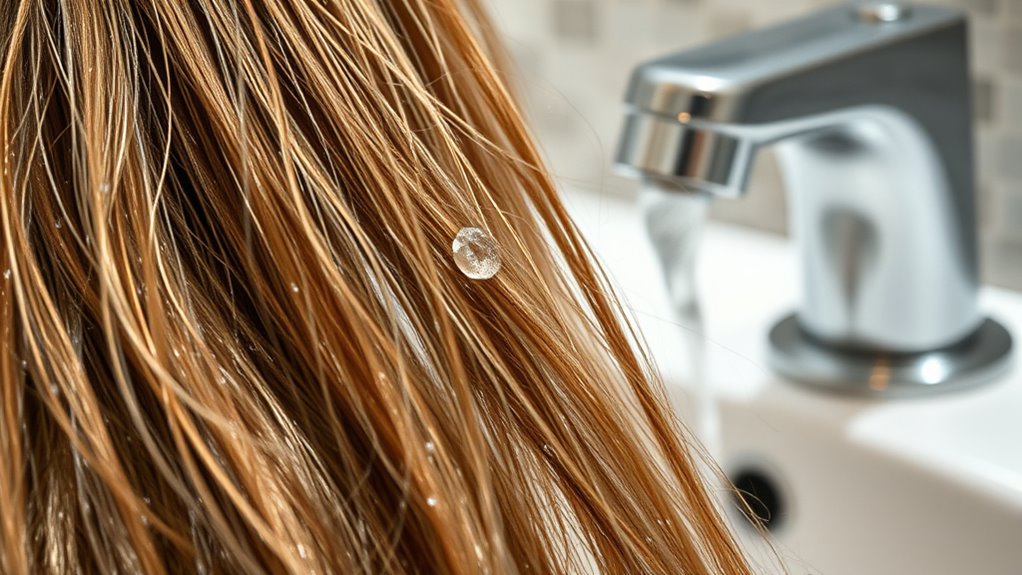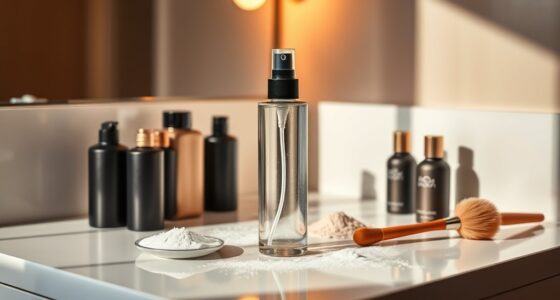If hard water is wrecking your hair, you can fight back by installing a shower filter or water softener to reduce mineral buildup. Use chelating or clarifying shampoos weekly to remove deposits, and incorporate deep conditioners or leave-in treatments to boost moisture. Rinsing with distilled water and avoiding excessive heat styling also helps restore health. Keep experimenting with these tips, and you’ll discover how to protect your hair from hard water damage effectively.
Key Takeaways
- Install a shower water softener or filtration system to reduce mineral deposits on hair.
- Use chelating or clarifying shampoos weekly to remove mineral buildup effectively.
- Incorporate deep conditioning treatments and leave-in conditioners to restore moisture and protect hair.
- Rinse hair with distilled or bottled water to minimize mineral residue.
- Minimize heat styling and trim damaged ends to maintain healthy, resilient hair.

Hard water can pose a substantial challenge for your hair, as the high mineral content often leaves your strands feeling dry, dull, and difficult to manage. The minerals, mainly calcium and magnesium, settle on your hair’s surface and inside the cuticles, causing buildup that hampers moisture retention and makes styling a chore. Over time, this buildup can lead to increased breakage, frizz, and a lifeless appearance, making it clear that your water quality is affecting your hair health.
Hard water deposits minerals that damage hair, causing dryness, dullness, and breakage over time.
The first step to combatting hard water damage is understanding how it interacts with your hair. When you wash with hard water, these minerals form a film around each strand, preventing your hair from absorbing moisture effectively. This leads to dryness and roughness, especially if you already have textured or chemically treated hair. If you notice your hair feels straw-like or your scalp becomes itchy or flaky, hard water might be the culprit. Recognizing these signs helps you take targeted action to protect your hair.
One effective way to reduce mineral buildup is to install a water softener or filtration system on your showerhead. These devices work by removing or neutralizing the minerals before they contact your hair and scalp. A simple shower filter can considerably decrease mineral deposits, allowing your hair to retain more moisture and feel softer. If installing a filtration system isn’t feasible, using chelating or clarifying shampoos once a week can help strip away mineral residues. Look for products containing chelating agents like EDTA, which bind to minerals and wash them out effectively.
In addition to using specialized shampoos, conditioning your hair regularly is essential. Deep conditioners or hydrating masks help replenish moisture lost during washes and create a barrier against mineral buildup. Incorporate leave-in conditioners or serums with silicones or oils, which can coat your strands and provide an extra layer of protection. Be consistent with your routine; the more you nourish and protect your hair, the less susceptible it becomes to the adverse effects of hard water.
Another helpful tip is to be aware of the importance of trust in the quality of water and how it impacts your hair health. Rinsing your hair with distilled or bottled water for the final rinse can also help remove residual minerals and leave your hair feeling cleaner and softer. Combining this with a healthy hair care routine—using gentle, sulfate-free shampoos, avoiding excessive heat styling, and trimming damaged ends—can restore your hair’s health over time. Hard water may be a tough adversary, but with the right strategies, you can keep your hair looking shiny, smooth, and manageable despite the mineral-rich challenge.
Frequently Asked Questions
Can Hard Water Cause Scalp Irritation or Dandruff?
Yes, hard water can cause scalp irritation and dandruff. The minerals in hard water, like calcium and magnesium, build up on your scalp, clogging hair follicles and stripping away natural oils. This leads to dryness, itching, and flakiness, which can trigger dandruff. To combat this, you might want to use chelating shampoos, rinse with vinegar, or install a water softener to reduce mineral buildup and soothe your scalp.
How Often Should I Use a Clarifying Shampoo for Hard Water?
You should use a clarifying shampoo once every one to two weeks if hard water is affecting your hair. But beware—overdoing it can strip natural oils, leaving your scalp dry and hair brittle. Pay close attention to how your hair responds. If it feels overly dry or straw-like, cut back. Regular use keeps buildup at bay, restoring shine and softness without causing damage.
Are There Specific Hair Types More Affected by Hard Water?
Yes, you’ll find that curly, textured, or color-treated hair types are more affected by hard water. These hair types tend to be more porous, which traps minerals and causes dryness, frizz, and color fading. If you have any of these hair types, you should be extra diligent with water softening techniques, regular clarifying treatments, and moisturizing products to keep your hair healthy and vibrant despite the mineral buildup.
Do Water Softeners Improve All Hair Concerns Caused by Hard Water?
Water softeners markedly improve many hair concerns caused by hard water, like dryness, dullness, and buildup. They remove minerals that cause damage, leaving your hair smoother and more manageable. However, they might not fix every issue, such as scalp irritation or specific hair texture problems. To get the best results, combine softened water with the right hair care routine tailored to your hair type.
Can Hard Water Damage Be Reversed or Only Mitigated?
Hard water damage can often be reversed or at least improved, but it depends on how severe the damage is. You should start by clarifying your hair’s condition—if it’s just dryness or buildup, treatments and deep conditioning can restore softness and shine. However, if the damage caused breakage or significant structural changes, you might need professional help or time to grow out healthier hair. Regular use of water softeners can prevent further damage.
Conclusion
Just like the Sirens’ song lured sailors to rocky shores, hard water can tempt you into neglecting your hair. But with the right remedies, you can steer clear of damage and restore your hair’s shine and strength. Don’t let hard water be your Achilles’ heel—take action now, and your hair will thank you for it. Remember, every hero needs a shield; your water filter or clarifying shampoo is yours.









